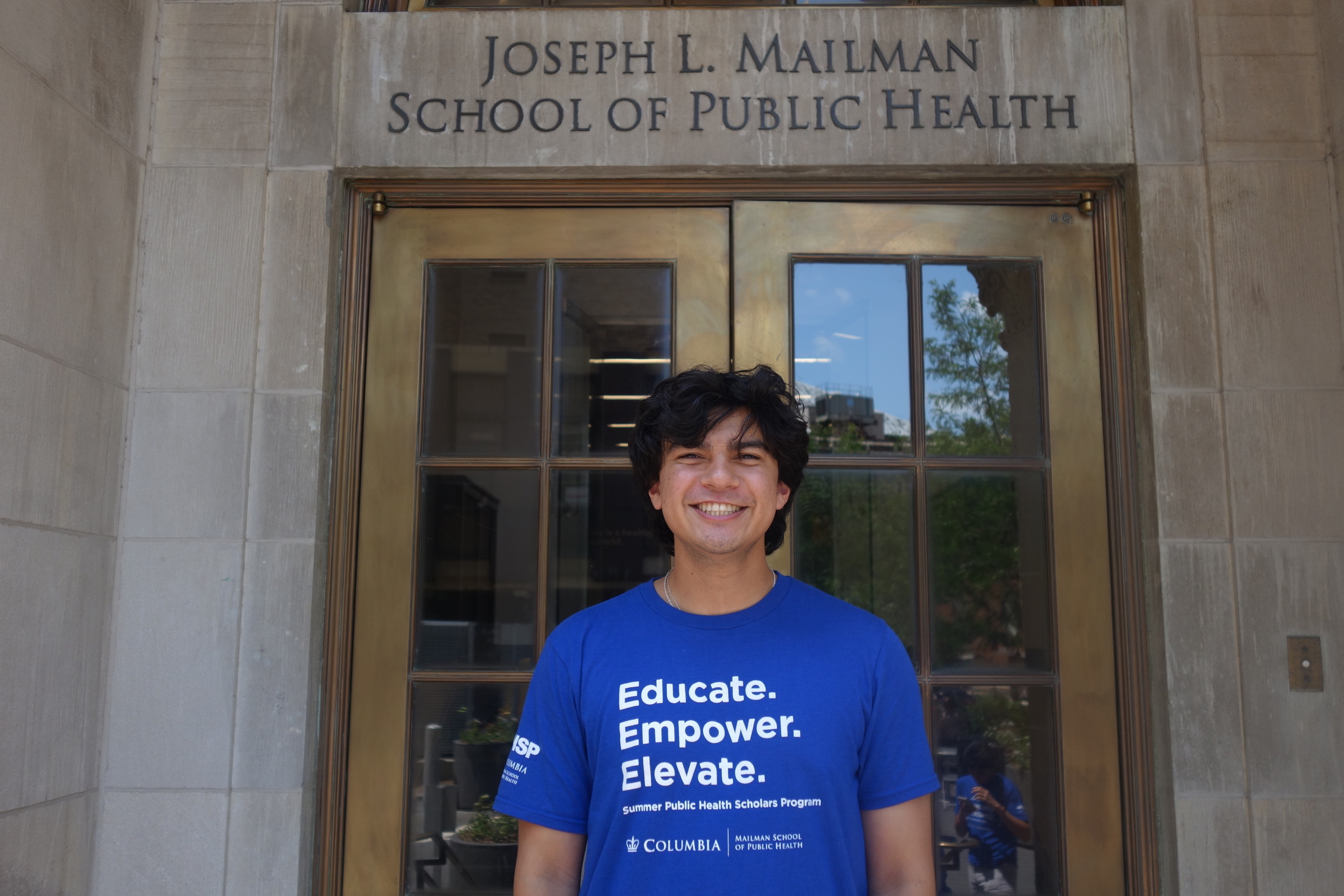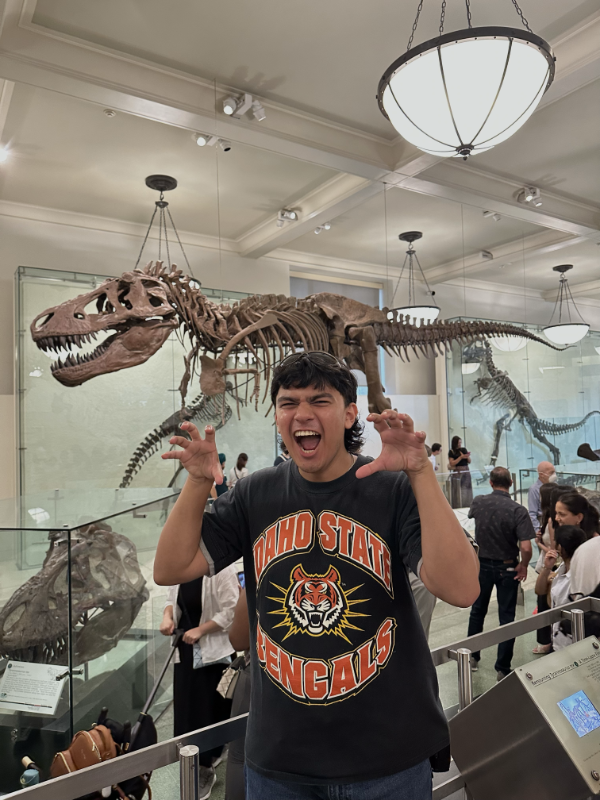Honors Student Returns from 10-Week Public Health Scholars Program at Columbia University
September 29, 2025

Idaho State University honors student Elijah Escobedo spent his summer inquiring about the lives of New Yorkers.
Escobedo, now a junior majoring in biology with a concentration in biomedical sciences from Twin Falls, wasn’t hawking some product or service; he was knocking on their door, wanting to hear what they had to say specifically about the public health topics affecting them.
“Overall, I was very curious,” said Escobedo. “I heard about the difficult decisions that they have to make on a consistent basis.”
He was in New York as a participant in Columbia University’s Summer Public Health Scholars Program, which offers students the chance to get “hands-on field experience and immersion in multi-sectoral public health issues” as well as “seminars and lectures with public health leaders; and mentoring by faculty members, ensuring students' exposure to the breadth and importance of public health as a career option.” Housed within the Energy Equity, Housing and Health Program at Columbia’s Mailman School of Public Health, the 10-week SPHSP program is highly selective, and he was one of just 29 scholars from across the nation to attend.
Escobedo found himself in the Big Apple thanks to a conversation he had with an advisor with ISU’s University Honors Program. They were chatting about Escobedo’s career goals, and at the time, he was considering heading to medical school after Idaho State and working towards becoming a dermatologist.
“He asked if I’d ever considered public health, and I really didn’t know what that was,” Escobedo said. “He explained public health to me and how a friend of his really enjoyed their experience in a public health program.”
Afterwards, the advisor sent him on his way with a list of summer internships, fellowships, and programs focusing on public health.
The SPHSP program at Columbia appealed to Escobedo; he applied and was ultimately chosen for the 2025 cohort.
“I wanted to go in the completely opposite direction of what I had been exposed to,” said Escobedo. “I saw it as an opportunity to interact with, learn from, and communicate with cultures, religions, and communities that I would have had fewer chances to engage with in Idaho. This exposure was a key motivator for me, as I believe that public health work must be rooted in cultural understanding and empathy.”
A few months later, Escobedo landed at LaGuardia Airport in Queens, one of New York’s five boroughs.
“I’d never been to the Northeast,” Escobedo said. “It was definitely a culture shock because you see the pictures and think New York’s big, and then I got there and I was like, ‘Oh, New York’s really, really big.”
After what he describes as a “stressful” trip navigating the M60 bus service, Escobedo arrived on the campus of Columbia University and got started. He met with SPHSP leaders, received an overview of the weeks ahead, and was introduced to the field of public health.
Boiled down, public health is about keeping people and communities — ranging from a national level to neighborhoods — healthy. However, the field is broad, encompassing “promoting healthy lifestyles, researching disease and injury prevention, and detecting, preventing and responding to infectious diseases,” according to the CDC Foundation.
Escobedo’s first day also included a personal tour of the Washington Heights neighborhood with one of the well-known names in public health: Robert Fullilove. Fulliove is currently the associate dean for community and minority affairs and a professor of clinical sociomedical sciences at Columbia. Over the course of his career, his research has focused on community and urban health, HIV/AIDS, and substance use disorders. He’s also served on various committees with the National Academy of Sciences, the Centers for Disease Control and Prevention, and the National Institutes of Health. Additionally, he is the senior advisor for the Bard Prison Initiative’s public health program, which provides access to higher education for incarcerated individuals, along with teaching courses in public health in the program. As a student himself, Fullilove helped to register voters in Mississippi during the Mississippi Freedom Summer in 1964 with the Student Nonviolent Coordinating Committee.
“His lore and history are really extensive,” said Escobedo. “He’s definitely a big inspiration and a super nice guy. Hearing about his research throughout his life regarding HIV is tremendous. His commitment to education and equity in underserved communities continues to inspire my own aspirations in public health.”
On day two, Escobedo heard about his first assignment: conducting the final interviews with participants in a study related to smoking in their apartment buildings. On day three, he was in their homes, asking them questions about how smoking in their building was affecting them.
“I was curious to see how problematic smoking was for the health of these individuals,” said Escobedo.
As the program progressed, Escobedo learned more about the ins and outs of public health in the classroom with lectures focused on epidemiology, biostatistics, public health law, and more. He also had the opportunity to accompany Felipe Antequera, a postdoctoral researcher at Columbia, for a one-on-one walking interview with a New York resident. Atequera is studying how different improvements to a neighborhood impact the health of residents. While walking through the iconic Bronx, Escobedo and another member of his cohort were responsible for taking photos and short videos as the researcher and subject chatted. Afterwards, Escobedo was also responsible for producing a transcription of the interview.
“Elijah distinguished himself as an outstanding participant,” said Antequera of working with Escobedo. “He was highly engaged in all of the research activities, approaching each task with enthusiasm and a genuine interest to learn. He demonstrated an impressive balance of social and technical skills, took his responsibilities seriously, and consistently delivered excellent work, completing all the tasks he was assigned. During our walk-along interviews in the Bronx, he not only supported the process effectively but also collaborated seamlessly as part of the team.”
“My favorite part was collaborating with Dr. Felipe, working on his interview, and walking through the Bronx,” Escobedo said. “In contrast with the smoking interviews where (the study’s participants) would talk about their struggles, I could tangibly see with my own eyes the issues, and these are real daily struggles that these people are going through.”
 Escobedo’s time wasn’t all work, though. He had the opportunity to see New York’s sights and experience some of what the city has to offer, including visits to the American Museum of Natural History, Times Square, and a performance of Aladdin the Musical on Broadway.
Escobedo’s time wasn’t all work, though. He had the opportunity to see New York’s sights and experience some of what the city has to offer, including visits to the American Museum of Natural History, Times Square, and a performance of Aladdin the Musical on Broadway.
“While it was research-heavy, and deadline-heavy, and you had to get your stuff done, we were still able to venture off into the city, so it was very fun,” Escobedo said.
Now back at Idaho State, Escobedo still has his sights set on attending medical school. However, his experience in New York shifted his focus from dermatology to primary care.
“Being at Columbia and doing the interviews and being in those vulnerable positions with those people helped me see how drastically needed primary care physicians are,” said Escobedo. “It also made me reflect on back home and my own mother’s experience growing up in rural Idaho, and there not being a Spanish-speaking physician led her and her family to not seek access to health care. I think both of those culminated in wanting to pivot more towards a primary care position within rural Idaho communities.”
Categories:
